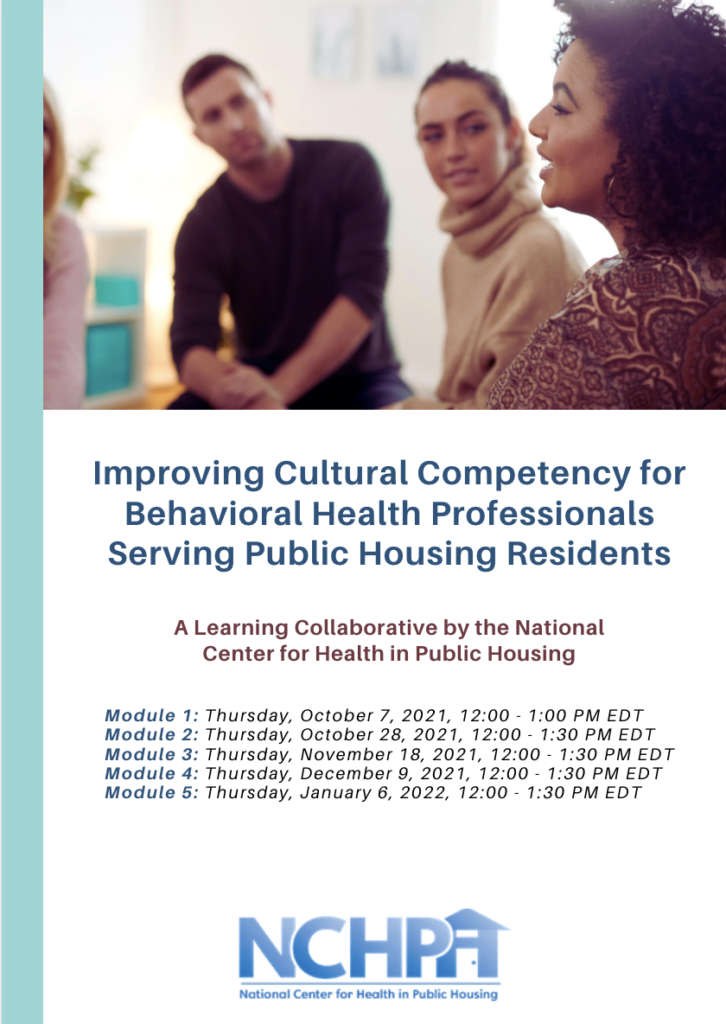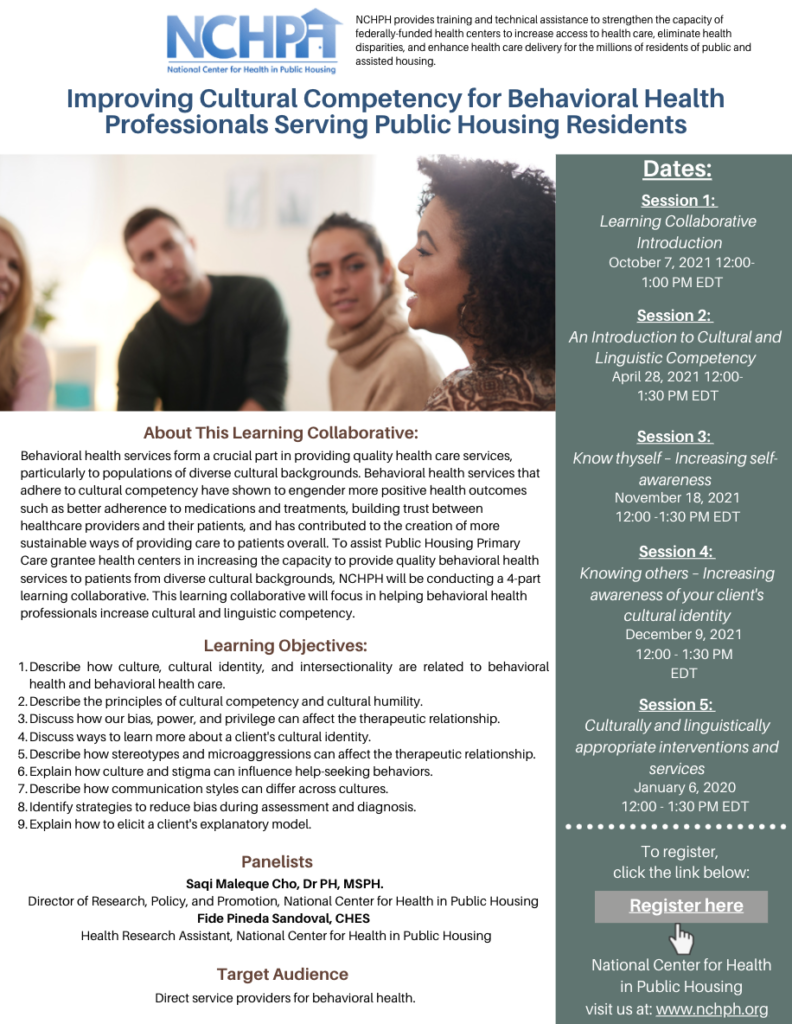About This Learning Collaborative:
Behavioral health services form a crucial part in providing quality health care services, particularly to populations of diverse cultural backgrounds living in public housing. Behavioral health services that adhere to cultural competency have shown to engender more positive health outcomes such as better adherence to medications and treatments, building trust between healthcare providers and their patients, and has contributed to the creation of more sustainable ways of providing care to patients overall.
To assist Public Housing Primary Care (PHPC) Health Centers grantees in increasing their capacity to provide quality behavioral health services to patients from diverse cultural backgrounds, NCHPH will be conducting a 5-part learning collaborative. This learning collaborative will focus in helping behavioral health professionals increase cultural and linguistic competency.
Moderators

Saqi Maleque Cho, DrPH, MSPH
Director of Research, Policy and Promotion
National Center for Health in Public Housing
Dr. Saqi Cho’s career has focused on addressing the broad social and economic policies that unintentionally shape the health of communities, leading to the vast inequities in health seen across the country. She has more than 15 years of experience in the field of the social determinants of health, particularly in the intersection of housing, community development, agricultural and food policy. In her current role, Dr. Cho leads the qualitative and quantitative research, program evaluation, and health policy activities at NCHPH. She has authored numerous reports on improving access to care and increasing health equity for public housing residents. Dr. Cho received a Doctorate in Public Health with a concentration in Health Policy from the George Washington University, a Masters of Science in Public Health from Meharry Medical College, and a Bachelors of Science from the University of Tennessee, Knoxville.

Fide Pineda Sandoval, CHES
Research Assistant, National Center for Health in Public Housing
Ms. Fide Pineda Sandoval is a research assistant at the National Center for Health in Public Housing and provides analytical, technical, and logistical support to the team. Ms. Pineda is a Certified Health Education Specialist and has over 5 years of experience in providing direct clinical and administrative assistance to health care providers. Prior to joining NCHPH, Ms. Pineda worked for the Office of Student Scholarship, Creative Activities and Research at George Mason University where she collaborated with research on racial disparities in cancer treatments and collaborated in a culturally sensitive weight-management intervention for low-income Latino youth.
To register, click the link below:
Structure of the Curriculum:
Module #1: Learning Collaborative Introduction
Thursday, October 7, 2021
12:00-1:00 PM ET
Learning Objectives:
1. Describe how culture can impact access to behavioral health care.
2.Describe the need for screening cultural identity.
3. Describe the learning collaborative curriculum.
Session Resource:
Slides
Module #2: An Introduction to Cultural and Linguistic Competency
Thursday, October 28, 2021
12:00-1:30 PM ET
Learning Objectives:
1. Describe how culture, cultural identity, and intersectionality are related to behavioral health and behavioral health care.
2. Describe the principles of cultural competency and cultural humility.
3. Explain how research, training, and professional culture influence care.
4. Explain how practicing cultural competency affects quality of care.
Session Resources:
Slides and Handout
Module #3: Know thyself – Increasing self-awareness
Thursday, November 18, 2021
12:00-1:30 PM ET
Learning Objectives:
1. Describe how bias influences our interactions with clients.
2. Identify harmful and unharmful uses of bias.
3. Discuss how our areas of privilege can influence the therapeutic relationship.
4. Explain how to practice cultural humility.
Session Resources:
Slides and Handout
Module #4: Knowing others – Increasing awareness of your client’s cultural identity
Thursday, December 9, 2021
12:00-1:30 PM ET
Learning Objectives:
1. Discuss ways to learn more about your client’s cultural identity.
2. Describe how stereotypes can affect the therapeutic relationship.
3. Explain the connection between stereotypes, discrimination, and oppression.
4. Recognize microaggressions in a behavioral health setting.
5. Describe how microaggressions can affect the therapeutic relationship.
6. Give examples of cultural concepts of distress.
7. Explain how culture and stigma affect help seeking.
Session Resource:
Slides
Module #5: Culturally and linguistically appropriate interventions and services
Thursday, January 6, 2022
12:00-1:30 PM ET
Learning Objectives:
1. Describe how communication styles can differ across cultures.
2. Recognize when to use an interpreter.
3. Recognize the potential for bias in different assessment methods.
4. Identify strategies to reduce bias during assessment and diagnosis.
5. Explain how understanding a client’s explanatory model helps you co-create a treatment plan.
6. Explain how to elicit a client’s explanatory model.
7. Give examples of cultural adaptations.
Supplemental Resources:

Welcome Packet
This welcome packet provides an introduction to the learning collaborative, in addition to the curriculum. Please click the link below to view the welcome packet for this learning collaborative.

Overview Flyer
This overview flyer provides basic information about this learning collaborative. Please click the link below to view the overview flyer.
